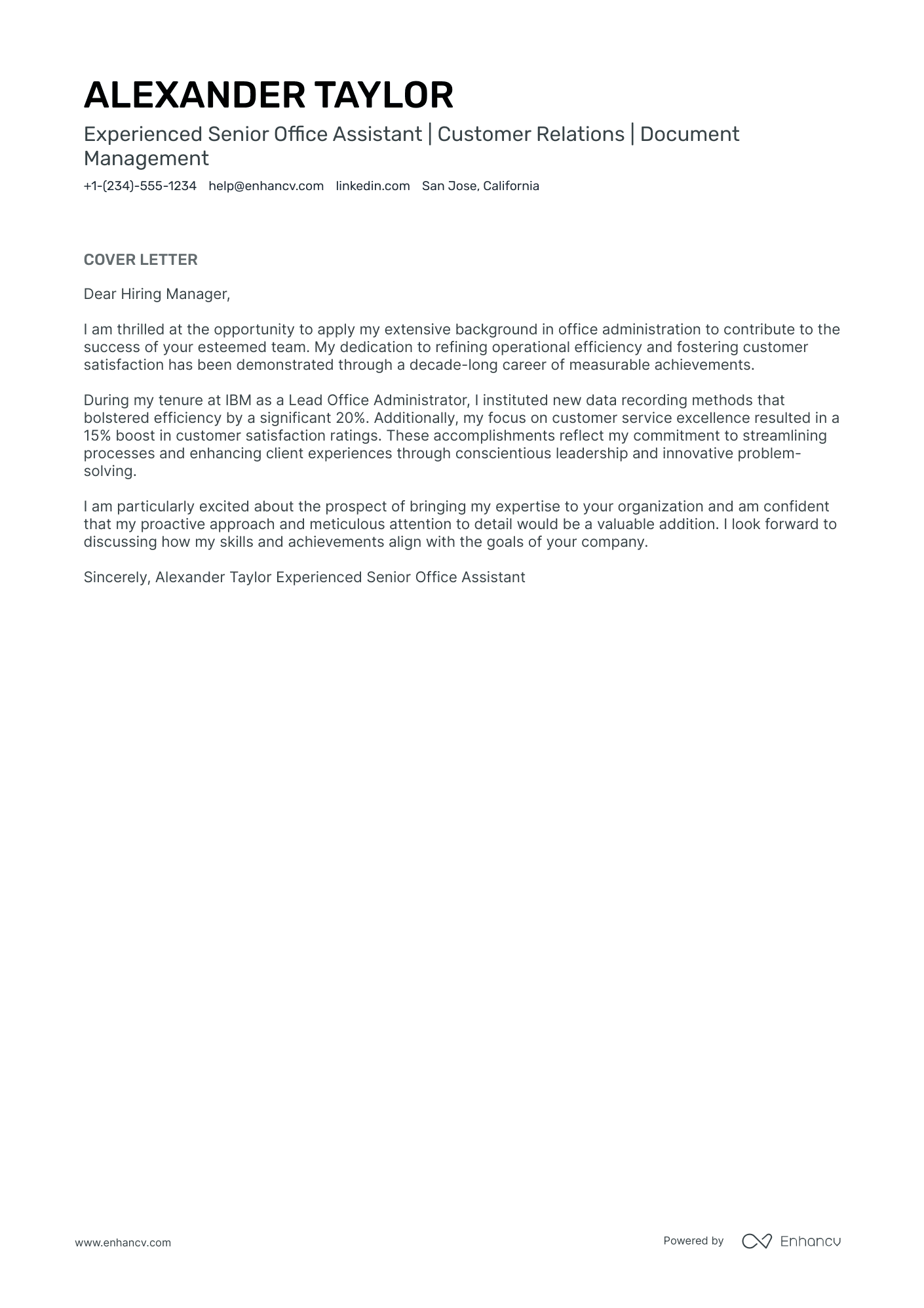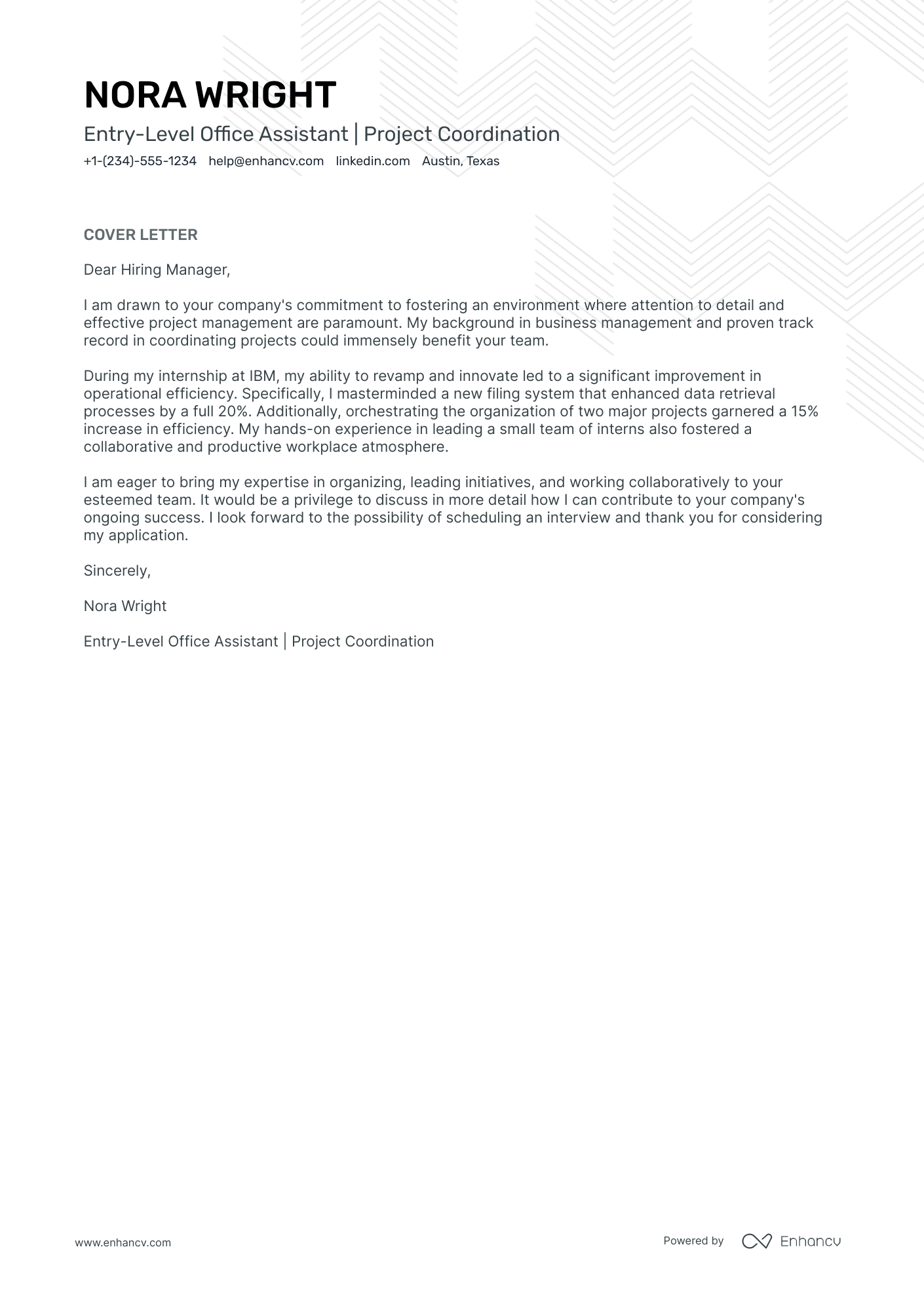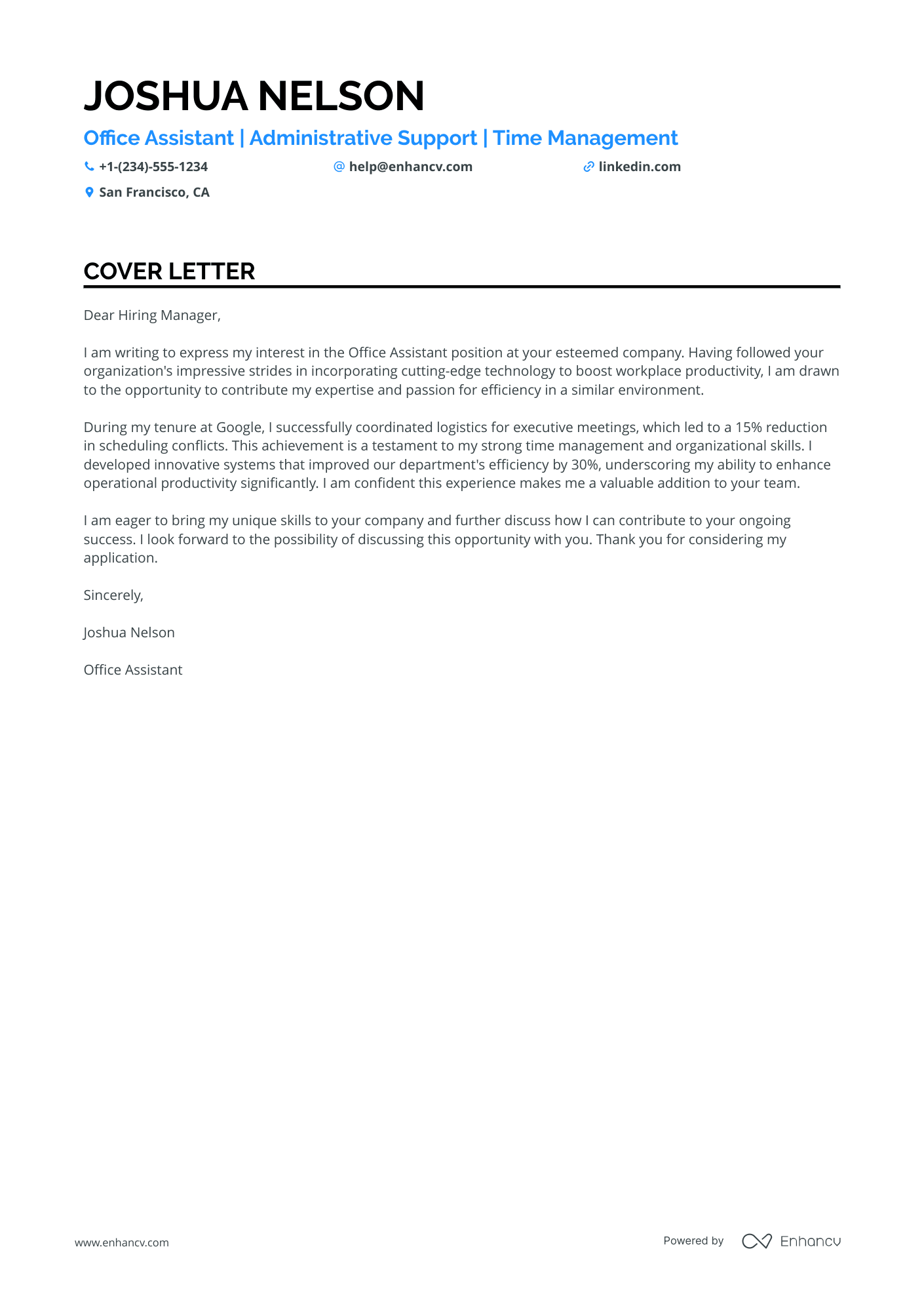Crafting an effective office assistant cover letter can be a stumbling block, even if you're well into your job search. You know not to parrot your resume, but how do you spotlight that proudest professional moment in a concise, engaging way? The trick is to weave a compelling narrative within a formal, yet original framework—sidestepping the cliches that hiring managers see all too often, all while fitting your story neatly on a single page. Let's dive in.
- Making excellent use of job-winning real-life professional cover letters;
- Writing the first paragraphs of your office assistant cover letter to get attention and connect with the recruiters - immediately;
- Single out your most noteworthy achievement (even if it's outside your career);
- Get a better understanding of what you must include in your office assistant cover letter to land the job.
Let the power of Enhancv's AI work for you: create your office assistant cover letter by uploading your resume.
If the office assistant isn't exactly the one you're looking for we have a plethora of cover letter examples for jobs like this one:
Drop your resume here or choose a file.
PDF & DOCX only. Max 2MB file size.
Office assistant cover letter example
Joan Anderson
Jacksonville, Florida
+1-(234)-555-1234
help@enhancv.com
- Highlighting relevant experience at a reputable institution like Mayo Clinic establishes credibility and shows that the candidate has worked in a demanding, professional environment.
- Emphasizing a track record of improving operational efficiency with concrete metrics (e.g., reducing document retrieval times by 40%, cutting a department's budget by 15%) demonstrates the candidate's impact on past employers and suggests a focus on both efficiency and cost-saving measures.
- Focusing on the candidate’s alignment with the company's values, such as a commitment to patient-centric service, suggests that the individual will fit well within the existing company culture and contribute positively to the team dynamic.
- Expressing eagerness to discuss potential contributions offers an open invitation for dialogue and expresses a genuine interest in the position, implying that the candidate is proactive and enthusiastic about working with the organization.
Standard formatting for your office assistant cover letter
Structure your office assistant cover letter, following industry-leading advice, to include:
- Header - with your name, the role you're applying for, the date, and contact details;
- Greeting - make sure it's personalized to the organization;
- Introduction paragraph - no more than two sentences;
- Body paragraph - answering why you're the best candidate for the role;
- Closing paragraph - ending with a promise or a call to action;
- Signature - now that's optional.
Set up your office assistant cover letter for success with our templates that are all single-spaced and have a one-inch margin all around.
Use the same font for your office assistant cover as the one in your resume(remember to select a modern, Applicant Tracker System or ATS favorites, like Raleway, Volkhov, or Chivo instead of the worn-out Times New Roman).
Speaking of the ATS, did you know that it doesn't scan or assess your cover letter? This document is solely for the recruiters.
Our builder allows you to export your office assistant cover letter in the best format out there: that is, PDF (this format keeps your information intact).
Don’t let cover letters slow you down. Use our free cover letter generator to create one in no time.
The top sections on a office assistant cover letter
- Header with Contact Information: Include your name, address, phone number, and email so the recruiter can easily contact you; it also presents a professional appearance.
- Professional Greeting: Address the hiring manager by name if possible, showing you’ve done your research and are personally invested in the application.
- Introduction: In this section, articulate why you are interested in the office assistant role and give an overview of your relevant skills and experiences that make you an ideal candidate.
- Body Paragraph(s): Detail your administrative experience, organizational skills, and technical proficiencies that match the job description, highlighting how you can specifically support the office’s operations.
- Strong Closing Statement: Reiterate your enthusiasm for the position, thank the recruiter for their consideration, and include a call to action, inviting them to contact you for an interview.
Key qualities recruiters search for in a candidate’s cover letter
- Proficiency in office software (e.g., Microsoft Office Suite, Google Workspace): Necessary for creating documents, managing spreadsheets, and preparing presentations.
- Strong organizational skills: Essential for managing files, scheduling, and keeping the office running smoothly.
- Excellent written and verbal communication: Important for drafting correspondence, dealing with phone inquiries, and communicating effectively with both staff and clients.
- Time management and multitasking abilities: Required to handle various tasks simultaneously and meet deadlines.
- Attention to detail: Critical for ensuring accuracy in data entry, appointment scheduling, and managing office supplies.
- Professionalism and discretion: Vital in maintaining confidentiality and presenting a positive image of the company to visitors and clients.
The office assistant cover letter salutation: how to address hiring managers
After covering the format of your office assistant cover letter, let's look at the salutation.
Back in the day, the cordial "To whom it may concern" or "Dear Sir/Madam", might have worked out fine.
But, nowadays, your cover letter should approach hiring managers on a more personal basis.
So, what to do about your cover letter salutation?
If you've messaged the recruiters and are on a first name basis or a more formal one, use the hiring manager's name in the greeting (e.g. "Dear Sophie," "Dear Ms. Givens", or "Dear Mr. Everett,").
Always aim to make the effort to find out the name of the hiring manager, who'd be assessing your application. Search on LinkedIn, double-check the advert on the corporate website, or message the brand on social media to find out more about the role.
If you can't find the hiring manager's name (and still want to sound professional), use "Dear HR Team,", "Dear Hiring Manager,", or the likes.
List of salutations you can use
- Dear Hiring Manager,
- Dear [Company Name] Team,
- Dear [Department] Team,
- Dear Ms. [Last Name],
- Dear Mr. [Last Name],
- Dear [First Name] [Last Name],
The office assistant cover letter intro: aligning your interest with the company culture
You only have one chance at making a memorable first impression on recruiters with your office assistant cover letter.
Structure your introduction to be precise and to include no more than two sentences.
Here are some ideas on how to write a job-winning office assistant cover letter introduction:
- get creative - show off your personality from the get-go (if this aligns with the company culture);
- focus on your motivation - be specific when you say what gets you excited about this opportunity.
How to select your best achievement for the middle, or the office assistant cover letter body
You probably feel exhausted by this point in your application: you've dived into all the details of your success and skills in your office assistant resume.
What else can you include in your office assistant cover letter body?
Well, for starters, the next three to six paragraphs should show you further value as a professional. Or, why should recruiters choose you?
Think back on a noteworthy achievement that answers key job requirements and dive deep.
Structure your office assistant cover letter middle as you'd a story: following chronological logic and highlighting outcomes, thanks to skills.
At the end of the day, you'd want recruiters to be able to see you as the best candidate for the role and understand more about who you are and what makes your success unique (and valuable to the role).
Final words: writing your office assistant cover letter closing paragraph
The final paragraph of your office assistant cover letter allows you that one final chance to make a great first impression.
Instead of going straight to the "sincerely yours" ending, you can back up your skills with a promise of:
- how you see yourself growing into the role;
- the unique skills you'd bring to the organization.
Whatever you choose, always be specific (and remember to uphold your promise, once you land the role).
If this option doesn't seem that appealing to you, close off your office assistant cover letter with a follow-up request.
You could even provide your availability for interviews so that the recruiters would be able to easily arrange your first meeting.
Lacking experience: here's how to write your office assistant cover letter
As a candidate with no experience, it's important to be honest from the get-go of your application.
Use your office assistant cover letter to sell your unique talents. Choose an accomplishment from your academic background or your volunteer work to show the skills that are relevant to the role.
Focus on your career objectives and how you see the job to align with them. Be specific and, at the same time, realistic about where you picture yourself in five years.
Key takeaways
Writing your office assistant cover letter has never been easier, so remember to:
- Select a office assistant cover letter template that automatically meets industry formatting (e.g. has one-inch margins, is single-spaced, is in PDF, etc.);
- Make your office assistant cover letter personal by mentioning the recruiters' first or last name;
- Within the introduction, describe what you like best about the company in no more than two sentences;
- Use your office assistant cover letter body to tell a story of your greatest achievement, backed up by job-relevant skills and technologies;
- If you have no professional experience, be honest about it in your office assistant cover letter, but also write about your unique talents.
Office Assistant cover letter examples
By Experience
Senior Office Assistant
Entry-Level Office Assistant
By Role
Back Office Assistant
- Tailored Experience: The applicant highlights relevant past experience at a reputable company (Google) that directly aligns with the job they are applying for, illustrating their capability to perform in a similar role.
- Quantifiable Achievements: By mentioning a 15% reduction in scheduling conflicts and a 30% improvement in departmental efficiency, the applicant uses specific metrics to demonstrate their impact and effectiveness in previous positions.
- Alignment with Company Values: The applicant expresses interest in the company’s focus on technology and productivity, showing that they are aligned with the organization’s goals and culture, which makes them appear as a good fit for the team.
- Proactive Enthusiasm: The conclusion shows eagerness to discuss the role further, which demonstrates a proactive and enthusiastic attitude, leaving a positive impression on the hiring manager.








